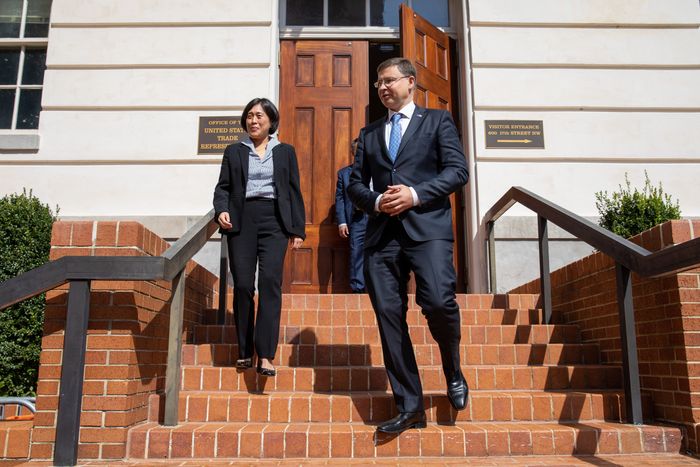BRUSSELS—For Europe’s top trade and economic official, the past year was largely about undoing damage. Now the agenda shifts to building anew, which promises to be more difficult.
Today, business people and politicians on both sides of the Atlantic talk more optimistically about commercial relations, and a huge EU financial rescue package is rolling out to member countries.
Mr. Dombrovskis, a softly-spoken former Latvian prime minister, has won plaudits for his role on both fronts.
At a U.S.-EU summit in Brussels in June, when he and U.S. Trade Representative Katherine Tai announced they would defuse a bitter fight over subsidies to plane makers Airbus SE and Boeing Co. , President Biden was so pleased by the progress that he joked he wanted to take Mr. Dombrovskis back to Washington to help get things done.
In October, Ms. Tai and Mr. Dombrovskis said they would shelve a fight over U.S. tariffs on steel and aluminum imposed by former President Donald Trump. The two met repeatedly during the fall to tackle issues including global tax revision and breathing life back into the moribund World Trade Organization.

U.S. Trade Representative Katherine Tai and Mr. Dombrovskis in Washington in September.
Photo: Amanda Andrade-Rhoades/Bloomberg News
Last year was “a very important year for repairing EU-U.S. trade relations, which were damaged during the Trump administration,” Mr. Dombrovskis said.
“What we’ve done, broadly speaking, lived up to expectations,” he said, noting that hopes were high for a reset when Mr. Biden took office. Challenges remain formidable, he said, “Clearly, there are many issues we need to work on.”
Still, even just stepping back from bitter fights has been greeted as progress in the trans-Atlantic business community.
“There has been really positive momentum coming out of the summit” last June, said Susan Danger, chief executive of the American Chamber of Commerce to the EU. Despite disputes weeks later about the withdrawal from Afghanistan and a controversial U.S. deal to sell submarines to Australia, she said, “We’re in a completely different place from a year ago.”
A big headache for this year will be trying to fix the WTO, where a high-level meeting scheduled for December has been moved to March due to the coronavirus. Many of its 164 members say the WTO should update its rules, dating to the 1990s, which never envisioned the digital economy or a country with China’s mix of capitalism and state control. The WTO has handled only a fraction of its work since the Trump administration blocked the appointment of judges to a crucial panel in the trade body.
In October, Ms. Tai said she was optimistic about fixing the WTO and that frequent in-person meetings she had with Mr. Dombrovskis during the fall were “continuing to build out a really positive working relationship I have” with him. “I hope he’s not sick of me,” she joked of their repeated encounters.
Yet despite improved relations and a trade-dispute armistice, “we haven’t really solved any problems,” said Fredrik Erixon, director at the European Centre for International Political Economy, a think tank in Brussels. The two sides have given themselves several years to resolve the aviation and metal-tariff fights, which are intertwined with complex domestic politics in both economies. Ambitions for WTO overhaul are modest, given the challenge of achieving necessary consensus, he said.
“There’s no doubt the WTO is in crisis,” said Mr. Dombrovskis. He said he is hopeful about defusing the crisis because “we see a willingness of the U.S. to engage.” The EU shares U.S. concerns that “the WTO rulebook is out of date” regarding digitization and China’s economy, he said.
With old disputes still festering, Mr. Dombrovskis hopes future fights can be averted or addressed with a new trans-Atlantic forum, the U.S.-EU Trade and Technology Council. The group, which held its first meeting in Pittsburgh in September, aims to address the problems of coming years, such as regulating artificial intelligence and cooperation on new industrial standards.
More on U.S.-EU Relations
The council is prompting cautious optimism in Brussels and Washington that it could become an institution that outlasts the current administration and lets the two sides discuss emerging challenges as they start coming into focus.
“It provides a continuous forum for engagement on these issues,” said Maria Demertzis, deputy director of Bruegel, a Brussels-based think tank.
Mr. Dombrovskis said the council’s 10 working groups and their subgroups will be meeting early in the year to look for concrete deliverables that could be presented at the next top-level meeting, provisionally set for France in spring.
Other initiatives that Mr. Dombrovskis is involved with could prompt friction with the U.S. and other countries, particularly China. Their goal is to combine the economic power of the bloc’s 27 countries and better control foreign access to its rich market of almost 450 million consumers.
Mr. Dombrovskis and his colleagues in the European Commission, the EU’s executive arm, are tightening rules to stop companies that receive foreign governments’ support from acquiring European companies or competing with them for certain EU contracts.
The bloc is also close to agreeing rules on international procurements that would let the EU lock out companies from countries that exclude European firms from their government contracts. The instrument likely would affect China but could also hit the U.S., where “Buy America” procurement rules often disfavor European bidders.
In December, Mr. Dombrovskis unveiled a separate anti-coercion instrument that would let the Commission impose tariffs or block exports from countries using economic arm-twisting against the EU, such as boycotts, border checks or safety inspections. The proposal will take months, if not years, to agree and enact.
Together, the measures “allow us to act in a more autonomous way, if needed,” by flexing the bloc’s economic muscle, Mr. Dombrovskis said. “We are committed to multilateralism but we are ready to act autonomously, if we must.”
Many observers are skeptical, saying that even if the EU adopts the proposed measures, achieving internal agreement to use them against powerful countries won’t be easy because of conflicting agendas among EU members.
Analysts note that in December, China effectively banned imports from tiny EU member Lithuania because of its support for Taiwan, which China considers a renegade province. A muted response from the Commission—which handles foreign trade for all EU countries—drew widespread note as a fresh sign of the bloc’s difficulty responding with unity and force to foreign pressures.
Mr. Dombrovskis said the Commission is following developments closely, trying to establish facts and “working through diplomatic and political channels to solve this issue.” He said reports that products from other EU countries with Lithuanian content are also being blocked by Chinese customs are concerning.
“We acknowledge the complexity of our relations with China,” Mr. Dombrovskis said, noting the EU considers China a partner in fighting climate change, a competitor in commerce and a system rival in social and economic governance models.
“We need to navigate this very complex relationship, given that China is the world’s second-largest economy,” he said.
Write to Daniel Michaels at [email protected]
Copyright ©2022 Dow Jones & Company, Inc. All Rights Reserved. 87990cbe856818d5eddac44c7b1cdeb8








